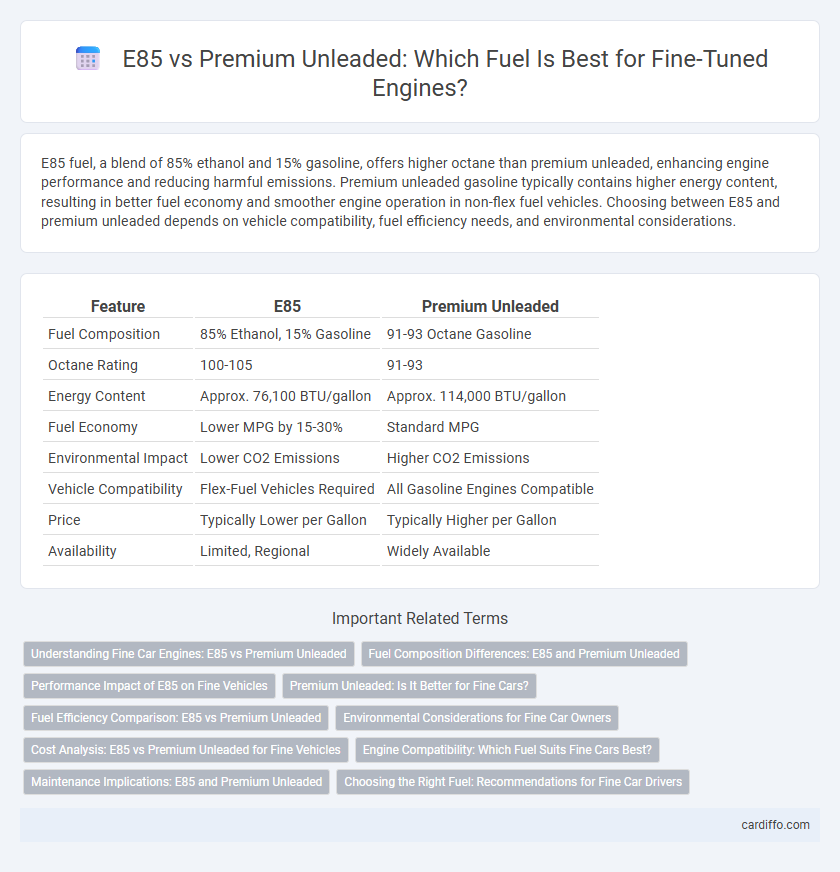E85 fuel, a blend of 85% ethanol and 15% gasoline, offers higher octane than premium unleaded, enhancing engine performance and reducing harmful emissions. Premium unleaded gasoline typically contains higher energy content, resulting in better fuel economy and smoother engine operation in non-flex fuel vehicles. Choosing between E85 and premium unleaded depends on vehicle compatibility, fuel efficiency needs, and environmental considerations.
Table of Comparison
| Feature | E85 | Premium Unleaded |
|---|---|---|
| Fuel Composition | 85% Ethanol, 15% Gasoline | 91-93 Octane Gasoline |
| Octane Rating | 100-105 | 91-93 |
| Energy Content | Approx. 76,100 BTU/gallon | Approx. 114,000 BTU/gallon |
| Fuel Economy | Lower MPG by 15-30% | Standard MPG |
| Environmental Impact | Lower CO2 Emissions | Higher CO2 Emissions |
| Vehicle Compatibility | Flex-Fuel Vehicles Required | All Gasoline Engines Compatible |
| Price | Typically Lower per Gallon | Typically Higher per Gallon |
| Availability | Limited, Regional | Widely Available |
Understanding Fine Car Engines: E85 vs Premium Unleaded
Fine car engines optimized for E85 fuel leverage its higher octane rating of 105, enabling increased compression ratios and improved performance compared to premium unleaded gasoline, which typically has an octane rating of 91-94. E85's ethanol content promotes cleaner combustion, reducing carbon deposits and emissions, while premium unleaded provides more consistent energy density for longer range. Understanding the compatibility and tuning requirements of fine engines ensures maximized efficiency and power output when choosing between E85 and premium unleaded fuels.
Fuel Composition Differences: E85 and Premium Unleaded
E85 fuel consists of approximately 85% ethanol and 15% gasoline, whereas premium unleaded is a high-octane gasoline blend typically containing 87 to 93 octane rating without ethanol. The higher ethanol content in E85 results in a higher oxygen content, promoting cleaner combustion but lower energy density compared to premium unleaded. Premium unleaded's gasoline composition offers greater energy per volume, leading to better fuel economy in vehicles not optimized for ethanol use.
Performance Impact of E85 on Fine Vehicles
E85 fuel, composed of 85% ethanol and 15% gasoline, can significantly enhance the performance of fine vehicles due to its higher octane rating, typically around 100-105, compared to 91-93 in premium unleaded. This higher octane allows engines to operate with increased compression ratios and advanced ignition timing, resulting in improved horsepower and torque output. However, the lower energy density of ethanol means fuel consumption may increase by 20-30%, requiring more frequent refueling despite the performance gains.
Premium Unleaded: Is It Better for Fine Cars?
Premium unleaded fuel offers higher octane ratings, typically between 91 and 93, which helps prevent engine knocking in fine cars with high-performance engines. Using premium unleaded ensures optimal combustion, enhancing engine efficiency, power output, and longevity compared to E85, which contains ethanol and may reduce fuel economy. For fine cars designed for premium fuel, consistently using premium unleaded preserves engine integrity and maintains manufacturer warranties.
Fuel Efficiency Comparison: E85 vs Premium Unleaded
E85 fuel typically delivers lower fuel efficiency than premium unleaded gasoline due to its lower energy content, resulting in approximately 25-30% fewer miles per gallon. Premium unleaded gasoline offers higher energy density, which translates into better miles per gallon and improved engine performance in vehicles not specifically optimized for ethanol blends. Vehicles designed to run on E85 may partially offset this efficiency gap through higher octane ratings, enhancing combustion and power output but generally not surpassing the fuel economy of premium unleaded.
Environmental Considerations for Fine Car Owners
E85 fuel reduces greenhouse gas emissions by up to 40% compared to premium unleaded, making it a more eco-friendly choice for fine car owners seeking sustainable options. Its higher ethanol content supports renewable energy sources and decreases reliance on fossil fuels. However, E85's availability may be limited, requiring owners to verify local fuel stations for consistent access.
Cost Analysis: E85 vs Premium Unleaded for Fine Vehicles
E85 fuel typically costs 20-30% less per gallon than premium unleaded gasoline, offering significant savings for drivers of compatible fine vehicles. However, E85's lower energy content results in approximately 25-30% reduced fuel economy, which partially offsets the price advantage. Considering the balance of cost per mile, premium unleaded may remain more economical for fine vehicles without flexible-fuel engines, while E85 is cost-effective primarily for vehicles optimized for ethanol blends.
Engine Compatibility: Which Fuel Suits Fine Cars Best?
E85 fuel, composed of 85% ethanol and 15% gasoline, requires flex-fuel compatible engines designed to handle higher ethanol content without damage, while premium unleaded gasoline suits most fine cars with conventional engines by providing higher octane levels that prevent knocking. Engines not specifically built or modified for E85 may experience reduced performance, fuel economy, and potential long-term damage due to ethanol's corrosive properties. For fine vehicles prioritizing engine longevity and optimal performance, premium unleaded remains the most compatible and reliable fueling choice.
Maintenance Implications: E85 and Premium Unleaded
E85 fuel typically requires more frequent oil changes and fuel system maintenance due to its higher ethanol content, which can cause increased wear on ethanol-sensitive components. Premium unleaded gasoline generally offers better lubrication and stability, leading to less frequent maintenance intervals. Vehicles optimized for E85 may need specialized parts to mitigate corrosion and ensure long-term engine health compared to those running on premium unleaded fuel.
Choosing the Right Fuel: Recommendations for Fine Car Drivers
E85 fuel offers higher octane levels and can improve performance in Flex-Fuel vehicles, while premium unleaded gasoline provides consistent energy density and engine compatibility for most fine cars. Drivers should consult their vehicle manufacturer's specifications to ensure optimal fuel choice, prioritizing engine type and warranty requirements. Choosing the right fuel enhances efficiency, maintains engine health, and supports environmental considerations specific to each car model.
E85 vs Premium Unleaded Infographic

 cardiffo.com
cardiffo.com